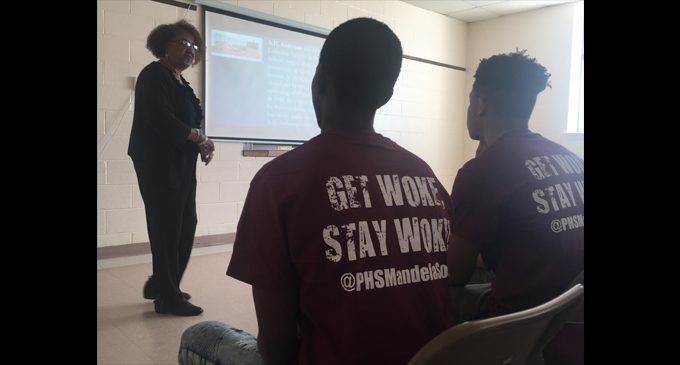Pop-up museum gives locals a chance to learn their history
Photos by Tevin Stinson Dothula Baron (left) tells students from Parkland High School about the history of the Big 4, and the Big 4 Alumni Association.

Imagine having a museum dedicated to the contributions and sacrifices made by African Americans right here in Winston-Salem. A place where young people and older persons alike could learn about people like George Black, Simon G. Atkins, Carl Matthews, Maize Woodruff, and others who paved the way for black people here in our community.
Thanks to the collaborative efforts of Winston-Salem/Forsyth County Schools, Action4Equity, and Triad Cultural Arts, Inc., last month that museum came to life. The three entities came together to create Heritage365, which had its debut during Black History Month. The community partnership hosted a pop-up history museum at the William Roscoe Anderson Jr. Community Center (Reynolds Park) titled “My Black Culture.” Other organizations such as The Winston-Salem Foundation, Z. Smith Reynolds Foundation, the Millennium Fund and others provided funding for the exhibit.
The exhibit, which was set up inside the computer lab at the recreation center, featured large printouts detailing the accomplishments of black people in the areas of Church & Spirituality, Local Black Activism, Entrepreneurship, and Education. Along with the exhibit, each Saturday throughout the month of February a guest speaker and teacher from within the district gave a presentation on the various focus areas.
Malishai Woodbury, WS/FCS School Board chair, said the pop-up museum was a way to bring black history to the community. She said when she started planning for the exhibit, she wanted to empower the students within the school district by showing them a part of the their history. Woodbury said she then approached Winston-Salem City Councilmember James Taylor, who is publisher of The Chronicle, with the idea and he suggested it be held at Reynolds Park, one of the most utilized recreation centers in the county, known for its youth basketball leagues that attract hundreds of children to the center throughout the year.
“We saw this as a way to bring history to the community, so we were intentional about finding a place where the community comes,” Woodbury continued. “Essentially the idea was to make available the information that I believe empowers a community, and that’s their history.”
Woodbury said the push from the community to make African American History a mandatory course is what ignited the idea for the museum. She said, “It was their advocacy that made us think outside the box.
“If it had not been for the will of this community to say we need to celebrate our history every day, we wouldn’t even be this far with Winston-Salem/Forsyth County Schools making sure that every high school now must offer African American History.”
When discussing her involvement with the exhibit, Kellie Easton, a local activist with Action4Equity, a grassroots organization created to uplift underperforming schools, said it felt good to connect the younger generation with those who have the knowledge of the past. Easton said, “It feels good to be able to involve the people who still have a memory of a lot of the things that happened.“
On the last day of the exhibit, city natives Linda Dark and Dothula Baron gave a presentation on the first African American high schools in the county, Atkins, Carver, Anderson and Paisley, the schools are widely known as the Big 4.
The Big 4 Alumni Association is an organization formed to preserve the history of the first black high schools in the area. Following the presentation, students from Parkland’s Mandela Society had the opportunity to ask Dark and Baron questions.
Before Dark and Baron wrapped up their presentation, Cheryl Harry, founder and CEO of Triad Cultural Arts, Inc., who put the exhibit together, encouraged the students and others in attendance to celebrate black history throughout the year, not just in the month of February.
“Black History Month is only one month, but Black History is year round,” Harry said. “Celebrate Black History, your history, throughout the year, don’t just limit it to one month.”










